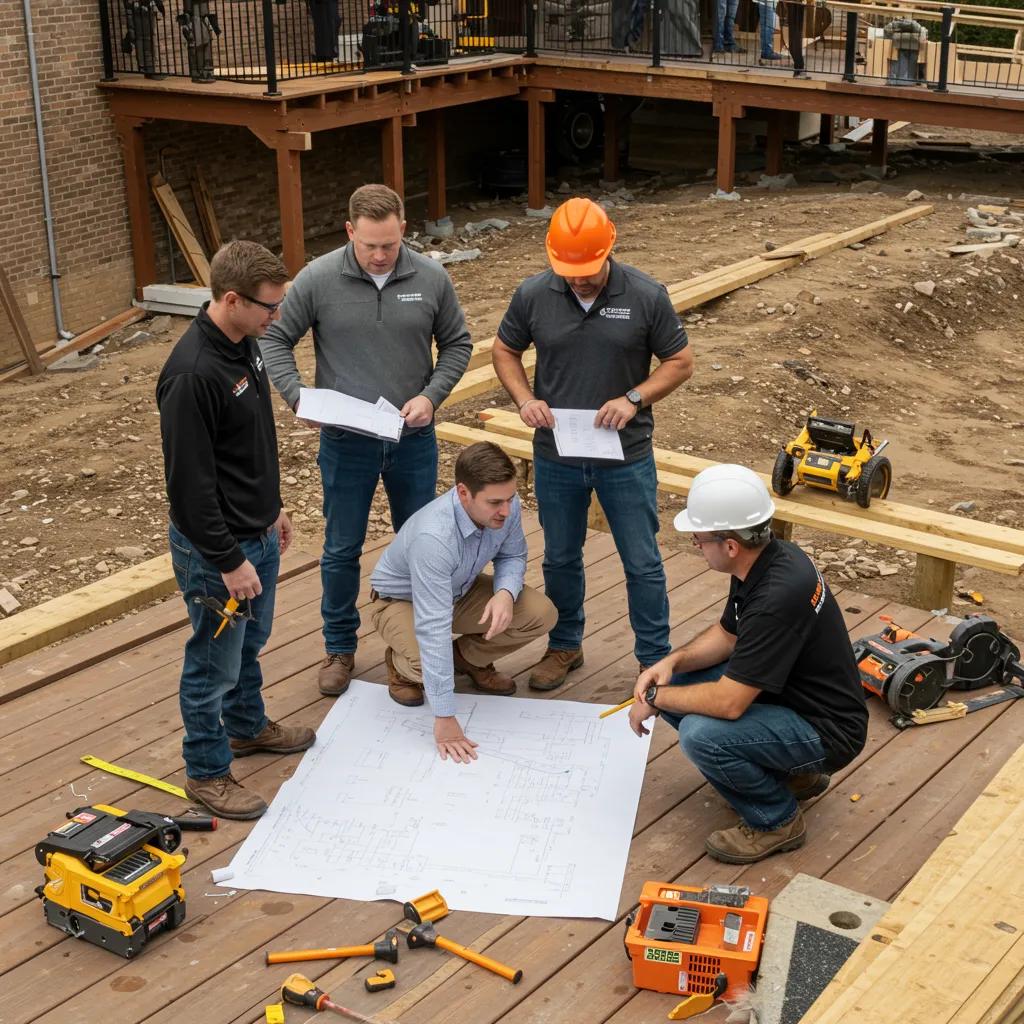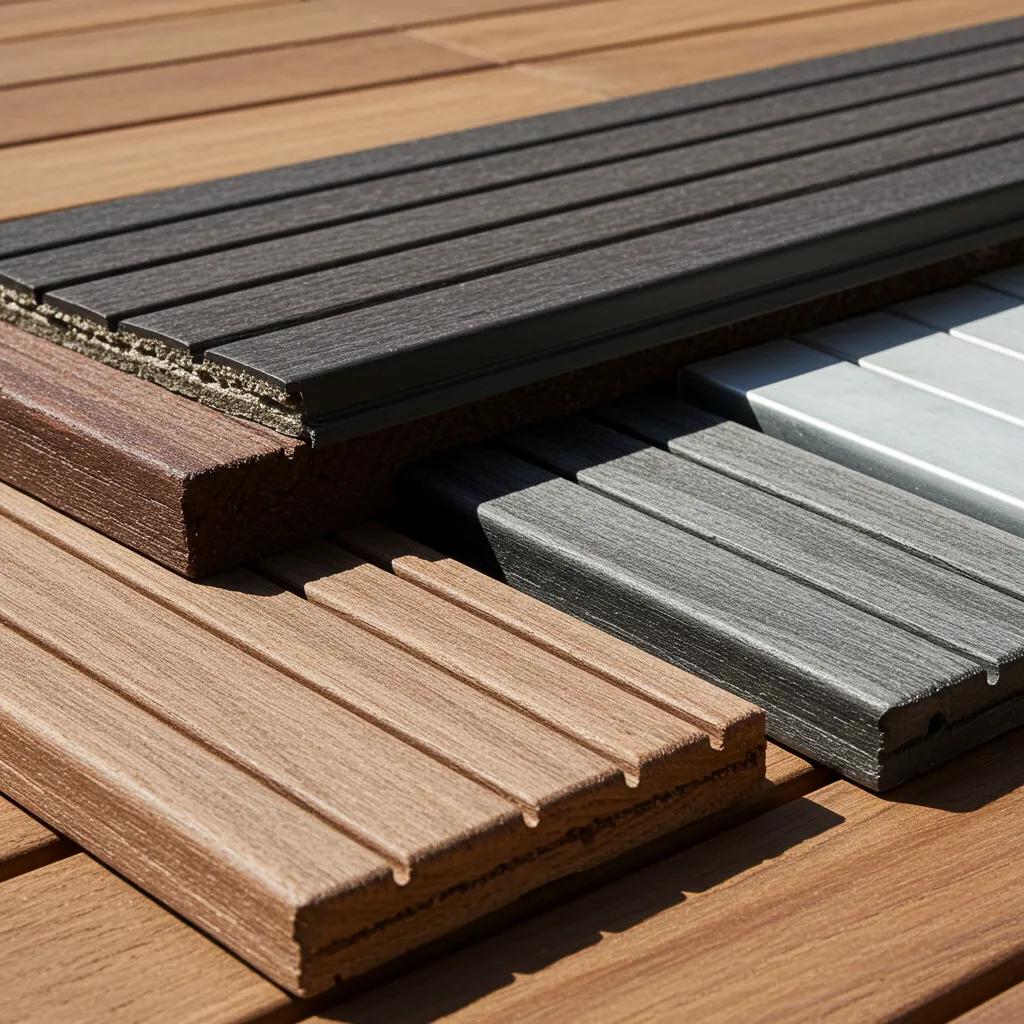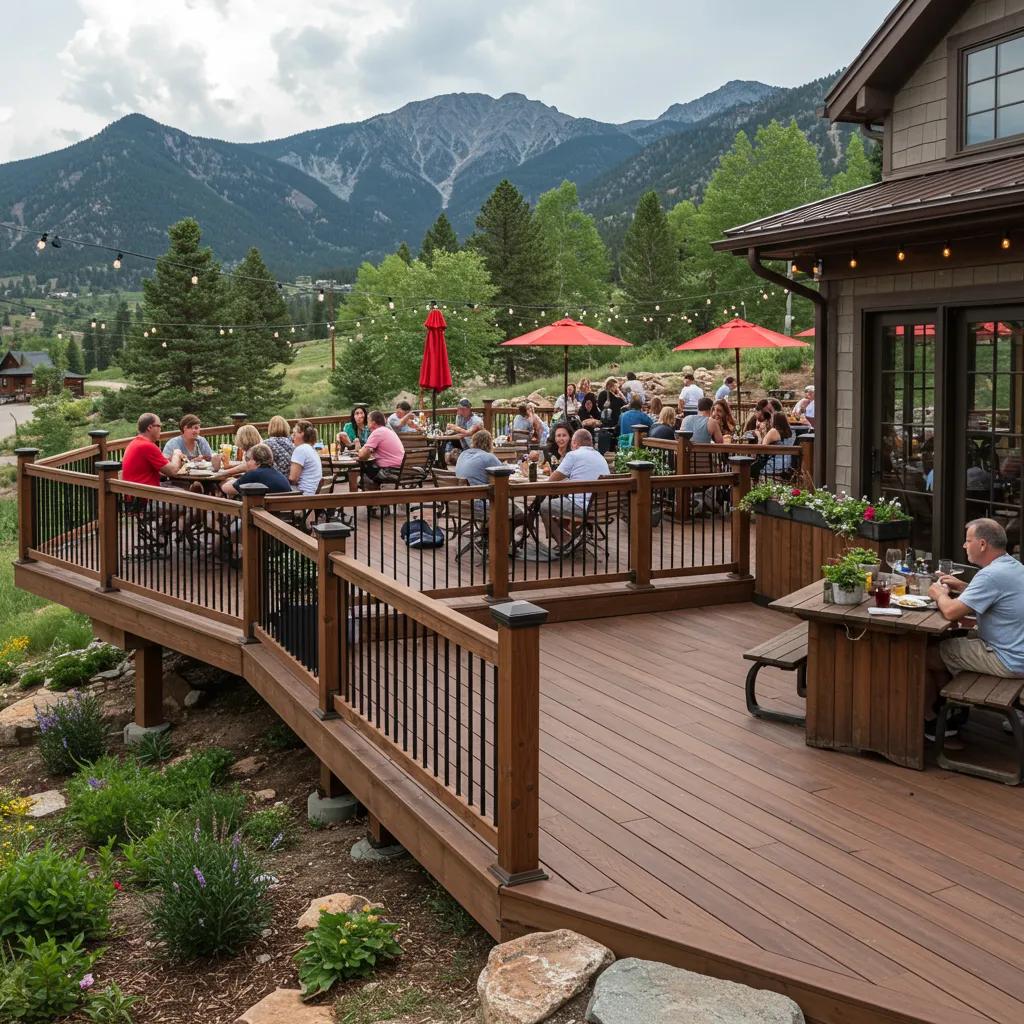Commercial Deck Installation Services in Douglas County: What to Expect
Douglas County Commercial Deck Installation: What to Expect
Adding a commercial deck transforms your business’s outdoor areas into valuable extensions, boosting guest experiences and property appeal. In Douglas County, challenging weather and strict local rules mean you need specialized expertise to ensure your deck is safe, built to last, and looks fantastic. This guide walks you through what to expect when you invest in commercial deck installation services in Douglas County. We’ll cover everything from what defines a commercial deck and your material choices to navigating permits, the construction process, costs, and upkeep. You’ll discover:
- What makes a deck a “commercial deck” and why it’s crucial for businesses
- The step-by-step installation process, specifically for Douglas County regulations
- The best decking materials for Colorado’s climate and heavy use
- How costs break down, strategies for maximizing your return on investment, and financing options
- Inspiring design ideas for restaurants, offices, and rooftop venues
- Maintenance tips to keep your deck looking great and protect your investment
At Colorado Elite Outdoor Contractors LLC, we bring local know-how, top-notch craftsmanship, custom designs, and complete service to every deck project. This guide brings all the essential information together, building confidence and clarity for business owners considering a new commercial deck.
What Is a Commercial Deck and Why Is It Important for Douglas County Businesses?
What Defines a Commercial Deck for Business Use?
A commercial deck is an outdoor platform built to handle foot traffic, furniture, equipment, and service operations for a business. It’s engineered with strong structural components—posts, beams, joists, and decking boards—to meet strict load-bearing and safety standards. By following Douglas County building codes, a commercial deck ensures proper drainage, sturdy railings, and slip-resistant surfaces. This functional design meets all legal requirements while allowing your business to expand customer seating, create employee break areas, or add rooftop amenities. Understanding these basics is key to appreciating the benefits that follow.
What Are the Benefits of Installing a Commercial Deck for Your Business?
Installing a commercial deck offers significant advantages, including better customer engagement, more seating options, and an improved brand image. Inviting outdoor spaces encourage patrons to stay longer, increasing average spending and foot traffic. Durable, code-compliant construction reduces liability risks and long-term maintenance costs. Commercial decks also boost property value and give you a clear competitive edge. These benefits align perfectly with Colorado Elite Outdoor Contractors LLC’s dedication to quality work and clear communication, ensuring every deck project meets your functional needs and aesthetic goals while keeping you happy.
Which Types of Commercial Decks Are Common in Douglas County?
- Outdoor dining decks for cafes and restaurants, perfect for al fresco service
- Rooftop decks for multi-story offices, creating unique event or lounge spaces
- Walk-out decks for ground-level retail, offering easy customer access
- Versatile patios with built-in lighting and power outlets
Each type balances design flexibility with regulatory compliance. Matching the deck style to your business needs boosts both operational efficiency and customer appeal, leading us into the detailed installation process in the next section.
How Does the Commercial Deck Installation Process Work in Douglas County?

What Happens During the Initial Consultation and Site Assessment?
The installation process kicks off with an on-site consultation where our specialists examine your site’s terrain, soil conditions, existing structures, and your business goals. Colorado Elite Outdoor Contractors LLC’s team assesses load requirements and identifies any potential drainage or erosion issues. We take photos, measurements, and talk with you to create a complete site profile. This crucial groundwork defines the project’s scope and budget, preventing unexpected costs down the line. A precise assessment is the foundation for a custom design that meets Douglas County regulations.
How Is the Custom Deck Design Created for Commercial Properties?
Custom deck design blends architectural vision with practical needs. Using the site data, our designers create detailed plans showing post placement, beam sizes, decking patterns, railing styles, and ADA-accessible ramp locations. We use computer-aided renderings to visualize aesthetic finishes and lighting. Material selection is based on climate resilience and your brand’s look. This collaborative phase ensures every structural and visual element meets local codes and operational needs, naturally leading to the permitting stage.
What Are the Steps for Obtaining Douglas County Commercial Deck Permits?
Getting permits involves submitting engineered plans and structural calculations to the Douglas County Building Department. You’ll need to provide site surveys, load analyses, and design documents detailing the deck’s height, footings, and safety features. The review process may include zoning checks and utility locates. Once approved, contractors receive permit authorizations that require inspections at the foundation, framing, and final stages. Navigating this regulatory process with expert help minimizes delays and ensures full legal compliance.
How Is the Commercial Deck Constructed and Inspected?
Construction follows a clear sequence: excavation and footing installation, post and beam assembly, joist placement, attaching decking boards, and installing railings or stairs. Throughout the process, inspectors verify compliance with permit requirements at specific checkpoints. Final inspections confirm that all fasteners are secure, guardrails are at the correct height, and fire and safety codes are met. This quality-focused approach results in an approved, ready-to-use deck that enhances your business operations while meeting all county standards.
What Are the Best Commercial Deck Materials for Douglas County’s Climate?

How Do Wood, Composite, and Metal Decking Compare for Commercial Use?
Choosing the right decking material depends on how durable it needs to be, how much maintenance it requires, your aesthetic preferences, and its load-bearing capacity. Here’s a comparison of key options:
| Wood Species | Density & Hardness | Maintenance Cycle | Fire & Slip Resistance |
|---|---|---|---|
| Pressure-Treated Pine | Moderately stable | Annual sealing | Moderate |
| Ipe Hardwood | High density | Biannual oiling | Excellent |
| Composite with PVC | Uniform boards | Low – periodic cleaning | Good |
Each material has its pros and cons: natural wood offers a warm look but needs frequent upkeep, while composite boards provide consistent performance with minimal effort. This comparison helps businesses balance initial costs with long-term durability against Colorado’s sun, snow, and temperature fluctuations.
Why Is Composite Decking Popular for Commercial Decks in Colorado?
Composite decking is a popular choice because it’s low-maintenance, looks consistently good, and resists moisture and UV damage. Available in custom colors and with protective capping, it resists staining and fading, lowering its long-term cost. With improved slip resistance and built-in antimicrobial properties, composite boards enhance safety in busy commercial areas. These advantages align with our local expertise and commitment to quality craftsmanship, ensuring your deck maintains a professional appearance year after year.
What Are the Maintenance Requirements for Different Deck Materials?
- Wood: Needs regular sealing or staining every 12–18 months and cleaning to prevent mold
- Composite: Requires occasional washing with mild soap and scrubbing with a soft brush
- Metal (aluminum or steel): Annual checks for rust, touch-up paint as needed, and debris removal
Consistent care prevents structural damage and safety hazards, extending the deck’s life. Understanding these needs helps businesses budget for upkeep and ensures customer safety, leading us to cost and ROI considerations.
What Are the Costs and ROI of Commercial Deck Installation in Douglas County?
What Factors Influence Commercial Deck Installation Costs?
- Size and Complexity – Larger decks and intricate designs increase material and labor expenses
- Material Selection – Premium hardwoods and high-end composites have higher per-square-foot prices
- Site Conditions – Uneven ground or the need to relocate utilities require extra groundwork
- Design Features – Built-in lighting, planters, and custom railings add to fabrication and installation time
- Permit and Inspection Fees – County-mandated charges vary based on project value
Understanding these cost factors helps businesses align their budgets with their design ideas and operational needs, maximizing ROI through smart choices.
How Can Businesses Maximize ROI from Commercial Decks?
- Enhancing Usable Space – Expanding seating or event areas increases revenue potential
- Brand Integration – Custom finishes reinforce your brand identity and build customer loyalty
- Energy Savings – Shaded decks can reduce interior cooling costs during warmer months
- Event Hosting – Versatile outdoor spaces can generate additional income through private bookings
Strategic planning of deck features and how you’ll use them turns installation costs into long-term asset value, improving property appeal and profitability.
Are There Financing Options Available for Commercial Deck Projects?
- Equipment Loans – Fixed-term financing where the deck serves as collateral
- Business Lines of Credit – Flexible credit to cover design and construction phases
- Commercial Improvement District (CID) Programs – Local assessments that spread costs among benefiting property owners
Exploring these options with financial advisors ensures your cash flow remains stable during the investment period, making deck installation more accessible for businesses.
What Local Building Codes and Permits Are Required for Commercial Decks in Douglas County?
What Are the Key Douglas County Building Codes for Commercial Decks?
Douglas County has specific codes covering structural integrity, safe exits, railing heights, footing depth, and load-bearing requirements. Decks raised above ground level must have guardrails at least 42 inches high, with baluster spacing no more than 4 inches apart. Footings must go below the frost line, and soil reports guide foundation design. Following these rules protects public safety and ensures consistent construction standards for all commercial properties.
How Do You Apply for a Commercial Deck Permit in Douglas County?
To apply for a permit, you’ll submit engineered drawings, site plans, and structural calculations to the county permitting office. You’ll complete forms detailing the project’s value, square footage, and contractor’s license information. After submission, the county reviews the documents for zoning compliance, stormwater management, and fire safety clearances. Once approved, permit placards are issued for display on-site, officially authorizing work to begin under county supervision.
What Common Permit Challenges Should Businesses Expect?
Common issues include incomplete structural details, inaccurate site surveys, and missed utility locates. Zoning setbacks and easement restrictions can also delay approvals. Hiring experienced deck contractors familiar with Douglas County procedures helps minimize resubmissions and speeds up permit issuance. Proactive communication with permitting officials further reduces administrative delays, ensuring your project starts on time.
What Commercial Deck Design Ideas Best Suit Businesses in Douglas County?
How Can Outdoor Dining Decks Enhance Restaurant Spaces?
Outdoor dining decks create lively gathering spots that can accommodate more guests and extend your operating season. By incorporating flexible seating, durable furniture, and ambient lighting, restaurants can offer memorable experiences that encourage repeat visits. Modular designs allow for easy reconfiguration for events, supporting private parties and community gatherings. Thoughtful design connects indoor and outdoor areas, increasing overall capacity and customer satisfaction.
What Are ADA Compliance Requirements for Commercial Decks?
ADA compliance ensures accessibility for patrons with mobility challenges. Deck designs include ramps with a 1:12 slope, handrails on both sides, and level landings at doorways and platform changes. Tactile warning strips indicate stair edges, and clear pathway widths of at least 36 inches accommodate wheelchairs. Meeting these standards makes your business more inclusive and shows a commitment to universal access.
What Are the Benefits of Rooftop Decks for Commercial Properties?
Rooftop decks make use of unused space, creating patios for socializing, break areas for employees, or event venues with stunning views. These elevated installations require specialized waterproofing and structural assessments to handle loads and wind forces. Successful rooftop decks enhance a brand’s prestige, offer unique revenue opportunities for events, and maximize property use without expanding the building’s footprint.
How Should Businesses Maintain and Care for Their Commercial Decks in Douglas County?
What Are the Best Practices for Cleaning and Sealing Commercial Decks?
Regular deck cleaning involves removing debris, gently power-washing surfaces, and promptly treating any stains. Wood decks benefit from annual inspections followed by stain or sealant applications to protect against moisture and UV rays. Composite decks need occasional washing with pH-neutral cleaners and light scrubbing to remove mold or mildew. Consistent care prevents surface damage and safety hazards.
When Is Commercial Deck Repair Necessary and What Does It Involve?
Deck repair is needed when boards warp, fasteners rust, or railings become loose. Addressing issues early—like replacing damaged boards, tightening hardware, and fixing flashing—prevents structural problems. In some cases, foundation settling might require adjustments or additional support posts. Timely repairs reduce liability risks and keep your deck usable for business operations.
How Can Proper Maintenance Extend the Life of Your Commercial Deck?
Regular inspections and upkeep extend your deck’s lifespan by preventing small issues from becoming major problems. Proactive steps—such as clearing debris from joints, reapplying protective coatings, and checking load-bearing connections—maintain structural integrity. This disciplined approach supports the long-term performance of your asset, protecting your initial investment and ensuring customer safety for years to come.
Enhancing your business with a commercial deck in Douglas County requires careful planning, designs that meet code, and ongoing maintenance. Expert builders use local knowledge, quality materials, and transparent processes to create durable, functional, and attractive decks. By understanding definitions, installation steps, material options, regulations, costs, design possibilities, and care routines, business owners can confidently undertake deck projects that improve customer experience, operational capacity, and property value. Rely on professional deck installation services to guide you from start to finish, unlocking the full potential of your outdoor commercial space.







